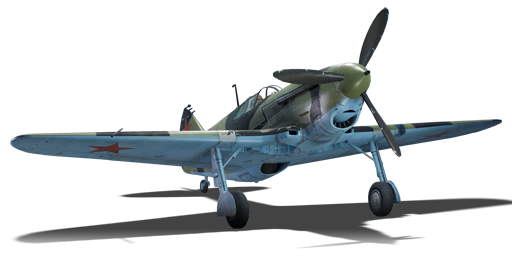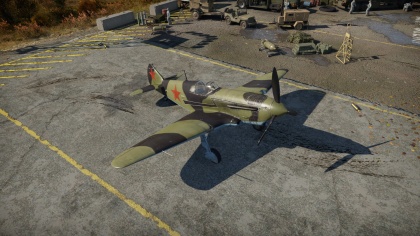LaGG-3-11
Contents
| This page is about the Russian fighter LaGG-3-11'. For other uses, see LaGG-3 (Family). |
Description
The LaGG-3-11 is a rank II Russian fighter
with a battle rating of 2.3 (AB/SB) and 2.0 (RB). This aircraft was introduced in Update 1.33.
General info
Like the other LaGG-3 models, the 3-11 has the advantage of an extremely low BR and cannon armament. The top speed is comparatively high when put against planes such as the P-36 or Ki-43. The climb rate is also quite good, attributed to the high max. speed an acceleration. However, the turn rate and elevator are extremely poor. Energy fighting is a must when it comes to the LaGG-3.
Since the LaGG-3 has cannon armament, a 2-4 second burst is all that is needed to shred an enemy plane. Use Ground Target belts for the best effect with both the Shvak and Berezin UB.
Flight Performance
| Characteristics | |||||||
|---|---|---|---|---|---|---|---|
| Stock | |||||||
| Max Speed (km/h at ?,000 m) |
Max altitude (meters) |
Turn time (seconds) |
Rate of climb (meters/second) |
Take-off run (meters) | |||
| AB | RB | AB | RB | AB | RB | ||
| ? | ? | 9000 | ??.? | ??.? | ??.? | ??.? | ??? |
| Upgraded | |||||||
| Max Speed (km/h at ?,000 m) |
Max altitude (meters) | Turn time (seconds) | Rate of climb (meters/second) |
Take-off run (meters) | |||
| AB | RB | AB | RB | AB | RB | ||
| ? | ? | 9000 | ??.? | ??.? | ??.? | ??.? | ??? |
Details
| Features | ||||
|---|---|---|---|---|
| Combat flap | Take-off flap | Landing flap | Air brakes | Arrestor gear |
| X | X | X | X | X |
| Limits | ||||
|---|---|---|---|---|
| Wing-break speed (km/h) |
Gear limit (km/h) |
Combat flap (km/h) |
Max Static G | |
| + | - | |||
| ??? | ??? | ??? | ~?? | ~? |
| Optimal velocities | |||
|---|---|---|---|
| Ailerons (km/h) |
Rudder (km/h) |
Elevators (km/h) |
Radiator (km/h) |
| < ??? | < ??? | < ??? | > ??? |
| Compressor (RB/SB) | ||
|---|---|---|
| Setting 1 | ||
| Optimal altitude | 100% Engine power | WEP Engine power |
| ?,??? m | ??? hp | ?,??? hp |
Armaments
Offensive armament
The LaGG-3-11 is outfitted with the following:
- 1 × 20 mm ShVAK cannon, nose-mounted (150 RPG)
- 1 × 12.7 mm Berezin UB machine gun, nose-mounted (200 RPG)
Usage in the battles
Describe the tactics of playing in an aircraft, the features of using vehicles in a team and advice on tactics. Refrain from creating a "guide" - do not impose a single point of view but give the reader food for thought. Examine the most dangerous enemies and give recommendations on fighting them. If necessary, note the specifics of the game in different modes (AB, RB, SB).
Manual Engine Control
| MEC elements | ||||||
|---|---|---|---|---|---|---|
| Mixer | Pitch | Radiator | Supercharger | Turbocharger | ||
| Oil | Water | Type | ||||
| Controllable | Not controllable | Not controllable | Not controllable | Separate | Not ontrollable | Not controllable |
Modules
| Tier | Flight performance | Survivability | Weaponry | ||
|---|---|---|---|---|---|
| I | Fuselage Repair | Radiator | |||
| II | Compressor | Airframe | |||
| III | Wings Repair | Engine | |||
| IV | Engine Injection | Cover | |||
Pros and cons
Pros:
- Cannon
- Effective Berezin UB MG
- Speed and climb rate
- Durability
- Substantial ammunition supply
Cons:
- Poor handling at high speeds
- Average horizontal handling, poor vertical handling
- Low ammo count with Berezin UB MG
- Poor roll rate
- Wings tend to snap when turning against biplanes
History
Describe the history of the creation and combat usage of the aircraft in more detail than in the introduction. If the historical reference turns out to be too big, take it to a separate article, taking a link to an article about the vehicle and adding a block "/ historical reference" (example: https://wiki.warthunder.com/Name-vehicles/historical reference) and add a link to it here using the main template. Be sure to include links to sources at the end of the article.
In-game description
"As a result of further work on transforming the LaGG from a “pure” fighter into a light attack aircraft, the LaGG 3 Series 11 appeared at the turn of 1941–1942. It had missile equipment and DZ-40 bomb racks for two bombs weighing up to 100 kg.
To reduce the plane's weight and finally increase its flight characteristics to acceptable levels, the series 11 completely lacked outboard fuel tanks, sacrificing flight range for speed. Suspended fuel tanks were intended for use when necessary, but in practice, they were only installed on a small batch of fighters made for the navy.
The following bombs could be suspended on the DZ-40 bomb racks underneath the wing: FAB-50 and FAB-100 general-purpose bombs, AO-25 fragmenting bombs and VAP-6M aerial spray instruments. These bomb racks could also carry ZAP-6 incendiary aerial instruments containing 38 liters of incendiary fuel each, or PSB-100 suspended fuel tanks containing up to 100 liters of gasoline.
RO-82 launchers for RS-82 rockets were also installed under the wing. The standard design allowed for the installation of six RO-82 launchers. Combat units armed the LaGG-3 with rockets themselves, so the number of rockets varied between four to eight RS-82 rockets.
Several planes were equipped with RO-132 rocket launchers instead of the RO-82, in order to launch the more powerful RS-132 rockets.
The LaGG-3 Series 11 went into production at the end of 1941. The first LaGG-3 Series 11 fighter-bombers took part in combat in the final stage of the Battle of Moscow, on the Kalinin front. Use of the LaGG-3 as a fighter-bomber and attack aircraft was relatively successful, as the LaGG-3 planes demonstrated higher combat survivability than other types of fighters.
Later on, the LaGG-3 Series 11 was replaced by the Series 23 in manufacturing facilities. The Series 23 was practically identical to the Series 11 and had the same combat characteristics. Their production continued from the end of the winter of 1942 to the summer of 1942 and was the peak period of LaGG-3 fighter manufacturing in terms of quantity."
Media
An excellent addition to the article will be video guides, as well as screenshots from the game and photos.
Read also
Links to the articles on the War Thunder Wiki that you think will be useful for the reader, for example,
- reference to the series of the aircraft;
- links to approximate analogues of other nations and research trees.
ETC.
Sources
Paste links to sources and external resources, such as:
- topic on the official game forum;
- page on aircraft encyclopedia;
- other literature.
| USSR fighters | |
|---|---|
| I-15 | I-15 WR · I-15 M-22 · I-15 M-25 · I-15bis · Krasnolutsky's I-15bis |
| I-153 M-62 · Zhukovsky's I-153-M62 · I-153P | |
| I-16 | I-16 type 5 · I-16 type 10 · I-16 type 18 · I-16 type 24 · I-16 type 27 · I-16 type 28 · I-180S |
| I-29 | I-29 |
| I-185 | I-185 (M-71) · I-185 (M-82) |
| I-225 | I-225 |
| ITP | ITP (M-1) |
| MiG-3 | MiG-3-15 · MiG-3-15 (BK) · MiG-3-34 |
| LaGG | I-301 · LaGG-3-4 · LaGG-3-8 · LaGG-3-11 · LaGG-3-23 · LaGG-3-34 · LaGG-3-35 · LaGG-3-66 |
| La | La-5 · La-5F · La-5FN · La-7 · Dolgushin's La-7 · La-7B-20 · La-9 · La-11 |
| Yak-1/7 | Yak-1 · Yak-1B · Yak-7B |
| Yak-3 | Yak-3 · Eremin's Yak-3(e) · Yak-3P · Yak-3T · Yak-3U · Yak-3 (VK-107) |
| Yak-9 | Yak-9 · Yak-9B · Golovachev's Yak-9M · Yak-9T · Yak-9K · Yak-9U · Yak-9UT · Yak-9P |
| Other countries | ▂P-40E-1 · ▂P-47D-27 · ▂Hurricane Mk IIB · ▂Fw 190 D-9 · ▂Spitfire Mk IXc |
| P-39 | ▂P-39K-1 · ▂Pokryshkin's P-39N-0 · ▂P-39Q-15 |
| P-63 | ▂P-63A-5 · ▂P-63A-10 · ▂P-63C-5 |





